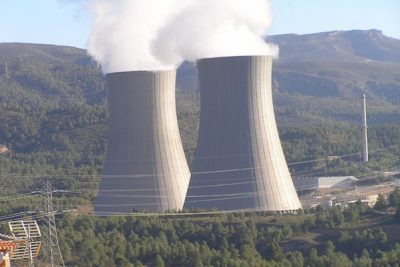The studies by three prestigious consulting firms (SR y Asociados, Compass Lexecon and International Financial Analysts) assert that with the current tax burden and the expected future prices in the wholesale market, the nuclear power plants will not recover their investment in Spain. Should they remain in operation? And extend their useful life? EnergyNews has spoken with Greenpeace and the Nuclear Industry Forum to find out their views.
Madrid. Elena Alonso Asensio
The three reports were presented on Tuesday at the session «Energy Transition: The Economic Viability of the Electric Generation Fleet,» organized by Endesa at the ESADE campus in Madrid. The day focused on the economic viability of power generation plants, particularly nuclear and hydraulic, at a time of intense debate over whether to extend the useful life of nuclear power plants and keep them operating during the energy transition phase, or limit it to 40 years.
As has been confirmed by EnergyNews, the three studies carried out by consulting firms SR and Associates, International Financial Analysts and Compass Lexecon- the latter with data from Endesa– were already known before their presentation by the Government. In addition, the newspaper «El Mundo» had already advanced some information on the content of this last report on Monday.
This is a study that compares the costs of nuclear technology in France with those of Spain, where nuclear would pay three times more in taxes, according to the aforementioned newspaper, an argument that could be used by its owners to argue the economic unfeasibility of the plants before the Government. According to sources consulted by EnergyNews, based on this study, the Spanish nuclear MW would have a tax cost of 8 euros more compared to the French one.
Nuclear plants will not recover their investment
On the one hand, the rationales that claim there is an excess remuneration for nuclear and hydroelectric power plants are essentially based on the opinion that these plants investments are already written off and they are benefitting from the existence of a marginal market that reciprocates payment to all technologies depending on the price of the most expensive. On the other hand, the opposite arguments defend that the investments are not yet written off and that the tax burden is excessive, a press release on the sessions summarizes.
Miguel Solchaga, CEO of SR y Asociados, during the presentation asserted that the actual revenues have been lower than those needed in excess of € 7,500 M for Endesa´s entire nuclear and hydroelectric power generating fleet.
From Compass Lexecon, Antón García, its vice president, explained that they have concluded that none of the technologies reaches the benchmark levels of profitability that were established for renewable generation in Spain after the 2013/14 reform.
Arturo Rojas, partner of International Financial Analysts, also said that the plants´ investments are not yet written off and with the application in 2013 of new taxes to generation it will not be possible to financially recover the investment made in the same under any credible scenario of future prices.
Should they remain in operation?
All agreed on the desirability of keeping these facilities operational, since, although they can not recover their historical investment costs, they manage to cover at least their operating costs. «The problem,» he explains, «becomes more complex, if at all, when it is necessary to undertake new investments, such as those necessary to extend the useful life of nuclear power plants beyond the age of 40. Although, as was just mentioned, incomes allow recovery of operating costs, it is very difficult that, under the current tax situation, the said incomes be also sufficient to make the recovery of these investments possible”.
As for the differences with France, in the opinion of Raquel Montón, of Greenpeace´s anti-nuclear campaign, in order to analyze the nuclear economy, it is necessary to speak of the entire package, and not only narrow it to the amount of taxes. «There are many different things in France that overturn the simple argument that less tax is paid in France compared to Spain, because there are other costs that are indeed assumed in France that in Spain are not» she says.
Differences between Spain and France
To illustrate this, she gave us three examples. The first, is that in France nuclear power plants adjust their production to the needs, while in Spain not «therefore, we have to pay their production one way or another, which in the case of nuclear involves producing radioactive waste one way or another.«
Secondly, Raquel Montón explains that the French operator takes on the reactors dismantling, while in Spain it is not the operator but the radioactive waste national company that is in charge of assuming this work. And lastly, she explains that in Spain the 7% tax on electricity production does not apply to nuclear energy, but to all systems of electricity generation «therefore, by including it as a specific nuclear cost, a cost for Spain is being included and yet other French general tax costs are not considered.«
The responsible for Greenpeace´s anti-nuclear campaign in Spain emphasizes that it is necessary to know that the Spanish wholesale market allows much greater margins for utilities than the French system and recalls that in Spain it must be emphasized that the reduction of prices (decrease of the margins) are the result of hydraulics, wind and other renewables; and consequently decrease the profits of nuclear, she explains.
«Then, to propose fiscal or other aid for a technology that has already made extraordinary gains, and in doing so prevent the competitiveness and real cost decrease of the electric system, with no mention to the external costs not considered of nuclear energy, is undoubtedly unreasonable. It means to allocate public money so that the taxpayers will pay more for their electricity, «she says.
A new regulatory framework?
For its part, the Nuclear Forum has replicated «it calls for a new regulatory framework to make nuclear energy viable and the reduction of tax rates that have been gradually shrinking the margins.» As per their explanations, at present, more than 40% of revenues are allocated to different types of taxes and, therefore, the sector is demanding a reduction of the same.
«The taxes borne by the Spanish nuclear power plants are taxes on the value of electricity production, the generation of spent nuclear fuel and radioactive waste, regional and local taxes and fees to Enresa and the Nuclear Safety Council,» they explain by writing.
By the way, the BOE has published the order that extends the deadline for Trillo, Cofrentes and Ascó to apply for their renewal, Europa Press publishes.




















